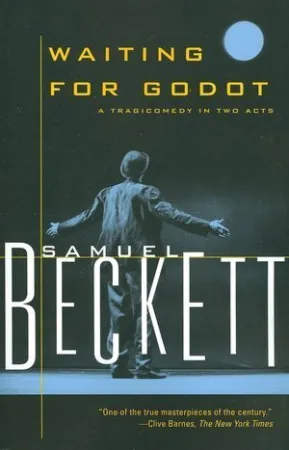Waiting for Godot Book Summary

A Brief Overview:
Samuel Beckett’s Waiting for Godot is a tragic comedy in two acts with a minimalistic setting – earth, an open road and a tree. The play through the two primary characters – Vladimir and Estragon, explores existentialism and the meaning of life.
Act I: The Beginning of an Endless Waiting
The Meeting between Estragon and Vladimir
The play starts with a minimal setting in the evening. First, we are introduced to Estragon – also known as Gogo, who is struggling with his shoes. And, soon Vladimir – also known as Dido, enters the setting wearing a hat. They meet each other and get busy with their shoes and hat.
Estragon and Vladimir Start the Conversation
Vladimir initiates the conversation by talking about the thieves who were crucified, beside Jesus. They talk about the Gospel, maps of the Holy Land and so on to pass their time.
Estragon Wants to Leave
After a good amount of time, Estragon is bored and tired of waiting for Godot. He wants to leave. But somehow, Vladimir convinces him to stay. Although none of them are aware of Godot’s time of arrival, they wait in anticipation for Godot.
Pozzo and Lucky Enters the Scene
As the play progresses, Pozzo – a domineering, and arrogant land owner with a whip and his servant Lucky. He made Lucky carry a lot of load around his neck. From a stool and basket to a bag and greatcoat.
Pozzo treats Lucky like a slave. He talks with Vladimir and Estragon on various topics like oratory about the night sky, shows how superior he is and later discloses why he treats Lucky that way. Soon, they leave the scene. And, Estragon along with Vladimir, returns to their futile waiting.
A Young Boy Arrives With a Message
Little later a young boy arrives – a messenger of Mr.Godot. He informs Estragon and Vladimir that Mr.Godot will not be arriving today but tomorrow. Pissed off by the news, both of them decide to call it a day but do not move an inch.
Act II: A Sequel to Act I – Continuation of Waiting
The Waiting Continues
The next day, we see the same thing – Estragon and Lucky waiting for the arrival of Godot. They engage in senseless, repetitive activities we have seen in Act – I.
They converse about their past, talk about “all dead voices”, and seasons, and even try to remember the events of yesterday. Both of them also enact the Pozzo and Lucky episode. Later, they decide to abuse each other to pass the time. All of their activity shows us how fragmented they are and the absurdness of their situation.
Pozzo and Lucky Returns
Just like in Act – I, Pozzo and Lucky enter the scene. But, this time their roles have reversed. Lucky is now the master, and Pozzo is dependent on him as he has lost his vision. Their conversation reflects how unpredictable things can be and how what goes around, definitely comes around.
No Sign of Godot’s Arrival
The boy arrives again and says he has never seen them. Then, goes on to inform them of the identical news – Mr.Godot will not be arriving today but tomorrow. Vladimir with all pent-up rage asks the boy whether he will remember them tomorrow or not.
Contemplation in the Final Moments
At the end of the play, we see Estragon and Vladimir contemplating. They are still waiting and thinking of hanging themselves from the tree. But all in vain. Ultimately, they decide to wait another day and call it a day with uncertainty. But, again, do not move an inch.
Beckett through the use of the Theatre of the Absurd in the play, invites us to have our interpretation and projects the role that uncertainty and waiting play in our daily lives.
2 Comments
Jordan Singer
2dSantiago Roberts
4d